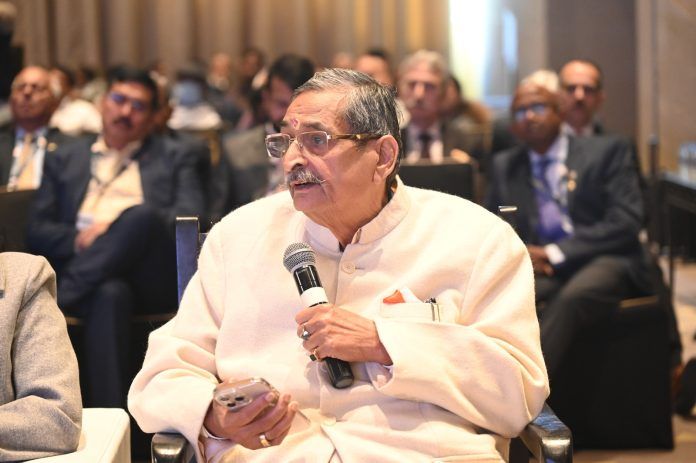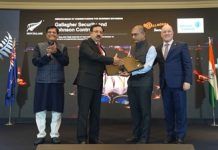34th IISSM Annual Global Conclave
11th – 13th December 2024 at New Delhi
Theme: Total Loss Prevention – Risk to Resilience
Tagline: Empowering People for a Sustainable Planet
The 34th IISSM Annual Global Conclave, themed “Total Loss Prevention-Risk to Resilience,” marked a significant milestone in the global dialogue on safety, security, and sustainability. Bringing together industry leaders, security professionals, academicians, policymakers, and experts from various domains, the conclave served as a platform for addressing some of the most pressing challenges of our time. Held over two transformative days, the event provided a unique opportunity for knowledge sharing, collaboration, and innovation, aiming to chart a path toward a safer, more resilient world.
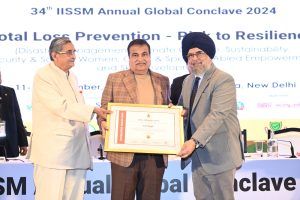 The inaugural session began with great enthusiasm, reflecting the ethos of the conclave. The ceremonial lamp lighting was led by Dr. R.K. Sinha, the Executive Chairman of IISSM, who in his welcome address highlighted IISSM’s longstanding role in pioneering advancements in security and disaster management. Dr. Sinha’s remarks emphasized the critical need for multi-stakeholder approaches to addressing global risks, particularly in a rapidly changing world. The Chief Guest, Hon. Minister Sanjay Seth, commended IISSM for its relentless efforts in areas such as skill development, disaster resilience, and empowering youth. He underscored the importance of leveraging collective expertise and collaboration to build capacity and drive sustainable solutions.
The inaugural session began with great enthusiasm, reflecting the ethos of the conclave. The ceremonial lamp lighting was led by Dr. R.K. Sinha, the Executive Chairman of IISSM, who in his welcome address highlighted IISSM’s longstanding role in pioneering advancements in security and disaster management. Dr. Sinha’s remarks emphasized the critical need for multi-stakeholder approaches to addressing global risks, particularly in a rapidly changing world. The Chief Guest, Hon. Minister Sanjay Seth, commended IISSM for its relentless efforts in areas such as skill development, disaster resilience, and empowering youth. He underscored the importance of leveraging collective expertise and collaboration to build capacity and drive sustainable solutions.
The Inaugural Plenary Session focused on “Global Security Challenges,” setting the tone for meaningful discussions. One of the standout speakers, H.E. Fares Sahib, Deputy Chief of Mission at the Embassy of Israel, shared Israel’s innovative strategies in disaster preparedness and counter-terrorism. His address illustrated the importance of education, early warning systems, and collaboration between sectors as essential tools for mitigating risks. Panelists explored evolving global risks such as climate change and terrorism, offering actionable insights into how public and private entities can work together to develop robust frameworks. A key takeaway from the session was the need to create cross-sector partnerships that would enhance early warning mechanisms and disaster preparedness systems, ultimately reducing vulnerabilities.
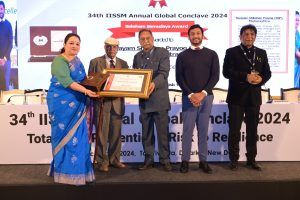 The subsequent plenary session, “Private Sector and PSUs in Total Loss Prevention,” delved into the role of private enterprises and public sector undertakings in building resilience and minimizing risks. Experts discussed the integration of technologies such as AI-driven surveillance systems and biometric tools into organizational workflows, emphasizing how these innovations can reduce the potential for losses while enhancing overall safety. Public-private partnerships emerged as a central theme, with participants advocating for closer collaboration between government bodies and private enterprises to tackle challenges effectively.
The subsequent plenary session, “Private Sector and PSUs in Total Loss Prevention,” delved into the role of private enterprises and public sector undertakings in building resilience and minimizing risks. Experts discussed the integration of technologies such as AI-driven surveillance systems and biometric tools into organizational workflows, emphasizing how these innovations can reduce the potential for losses while enhancing overall safety. Public-private partnerships emerged as a central theme, with participants advocating for closer collaboration between government bodies and private enterprises to tackle challenges effectively.
Later, the thematic session on “Business Continuity and Governance” examined strategies for ensuring operational resilience amidst an increasingly uncertain environment. Speakers elaborated on the importance of conducting risk assessments, implementing multi-layered security frameworks, and leveraging automation to respond swiftly to incidents. These discussions underscored the necessity for organizations to adopt proactive measures, such as comprehensive training programs and technology-driven solutions, to safeguard operations and ensure business continuity.
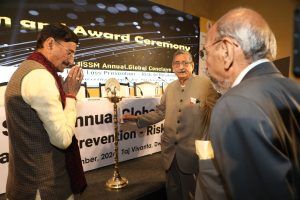 The second day of the conclave brought a renewed focus on climate change and its profound implications for disaster management and sustainability. The session on “Disaster Management, Climate Change, and Sustainability” addressed the economic and societal impacts of climate change, emphasizing the need for proactive corporate responsibility. Prof. Ravi Sinha, a noted expert, shed light on localized adaptation strategies as a cornerstone for building resilience. He emphasized that while global efforts are crucial, localized actions tailored to specific vulnerabilities can be equally, if not more, effective. Recommendations from the session included increasing climate finance, investing in disaster-resilient infrastructure, and actively involving corporations in sustainability initiatives. These discussions resonated deeply with participants, reflecting the urgency of embedding climate-conscious practices into both policy and practice.
The second day of the conclave brought a renewed focus on climate change and its profound implications for disaster management and sustainability. The session on “Disaster Management, Climate Change, and Sustainability” addressed the economic and societal impacts of climate change, emphasizing the need for proactive corporate responsibility. Prof. Ravi Sinha, a noted expert, shed light on localized adaptation strategies as a cornerstone for building resilience. He emphasized that while global efforts are crucial, localized actions tailored to specific vulnerabilities can be equally, if not more, effective. Recommendations from the session included increasing climate finance, investing in disaster-resilient infrastructure, and actively involving corporations in sustainability initiatives. These discussions resonated deeply with participants, reflecting the urgency of embedding climate-conscious practices into both policy and practice.
A highlight of Day 2 was the keynote address by Union Minister, Shri Nitin Gadkari, who emphasized sustainability in infrastructure development as a key to achieving long-term resilience. He announced forthcoming collaborations with IISSM to develop innovative safety education models, a move that underscored the government’s commitment to fostering safer communities through education and awareness.
One of the most impactful sessions of the day focused on “Empowerment of Vulnerable Groups,” addressing the need for targeted strategies to protect women, children, and persons with disabilities during disasters. Panelists stressed the importance of integrating self-defense and safety training into school curricula, ensuring that young people are equipped with the skills they need to navigate crises. Gender-sensitive planning and inclusive disaster response frameworks were highlighted as essential components of effective safety strategies. The session concluded with a call to action for policymakers and organizations to prioritize the unique needs of vulnerable groups in all safety and resilience initiatives.
Another key area of focus was “Workforce Development and Skill Enhancement,” where experts discussed the growing demand for skills in areas such as green jobs, cybersecurity, and disaster preparedness. Participants emphasized the need for localized certification programs that address the specific needs of communities, as well as the integration of advanced technologies like Artificial Intelligence (AI) and Geographic Information Systems (GIS) into training programs. These measures, they argued, would not only prepare the workforce for emerging challenges but also create pathways for sustainable economic growth.
The thematic session on “School Safety and Child Protection” highlighted the critical need to safeguard children during disasters. Discussions revolved around empowering teachers with training in psychological first aid and incorporating digital safety programs into school curricula. The session also emphasized the importance of creating a culture of safety within schools, where students, teachers, and parents work collaboratively to build disaster-resilient communities.
In addition to these discussions, the conclave featured special contributions from distinguished speakers. Mr. Rajendra Ratnoo, Executive Director of NIDM, provided valuable insights into capacity building and the role of technology in disaster risk reduction. He called for the adoption of innovative, technology-driven approaches to address the challenges of the 21st century. Mr. Dhiraj Singh delivered an engaging talk on the seven dimensions of security, emphasizing the transformative potential of AI-driven tools, robotics, and public-private collaborations in creating safer environments.
The conclave also showcased a wide range of innovative tools and technologies through product presentations by leading organizations. Companies such as IDEAFORGE, Motorola Solutions, and Prakhar demonstrated advancements in drone technologies, CCTV surveillance, and AI-driven solutions for real-time threat detection. EMOHA highlighted its elder care solutions, showcasing how technology can be harnessed to ensure the safety and well-being of senior citizens. These presentations provided attendees with actionable insights into how emerging technologies can be leveraged to enhance safety and disaster management practices.
Recognizing excellence in safety and resilience, the conclave honoured individuals and organizations with awards such as the Nirbhaya Raksha Award for advancing women’s safety initiatives, the Saksham Samudaya Award for fostering community resilience, and the Surakshet Gurukul Award for promoting school safety. These awards celebrated the remarkable efforts of those working tirelessly to create a safer and more resilient society.
The conclave concluded with key recommendations aimed at driving progress in safety, security, and sustainability. Participants called for strengthening public-private partnerships, integrating advanced technologies such as AI, GIS, and big data into safety practices, and developing inclusive frameworks that prioritize vulnerable groups. Other recommendations included expanding localized training programs, increasing climate finance, and embedding risk-informed planning into infrastructure development.
Conclusion
The 34th IISSM Annual Global Conclave reaffirmed its leadership in fostering global innovation and collaboration. By addressing the complex challenges of safety, security, and sustainability, the event paved the way for a future defined by resilience and inclusivity. IISSM remains committed to empowering individuals and organizations to build a sustainable planet, ensuring that the legacy of this transformative conclave continues to inspire action and innovation.



